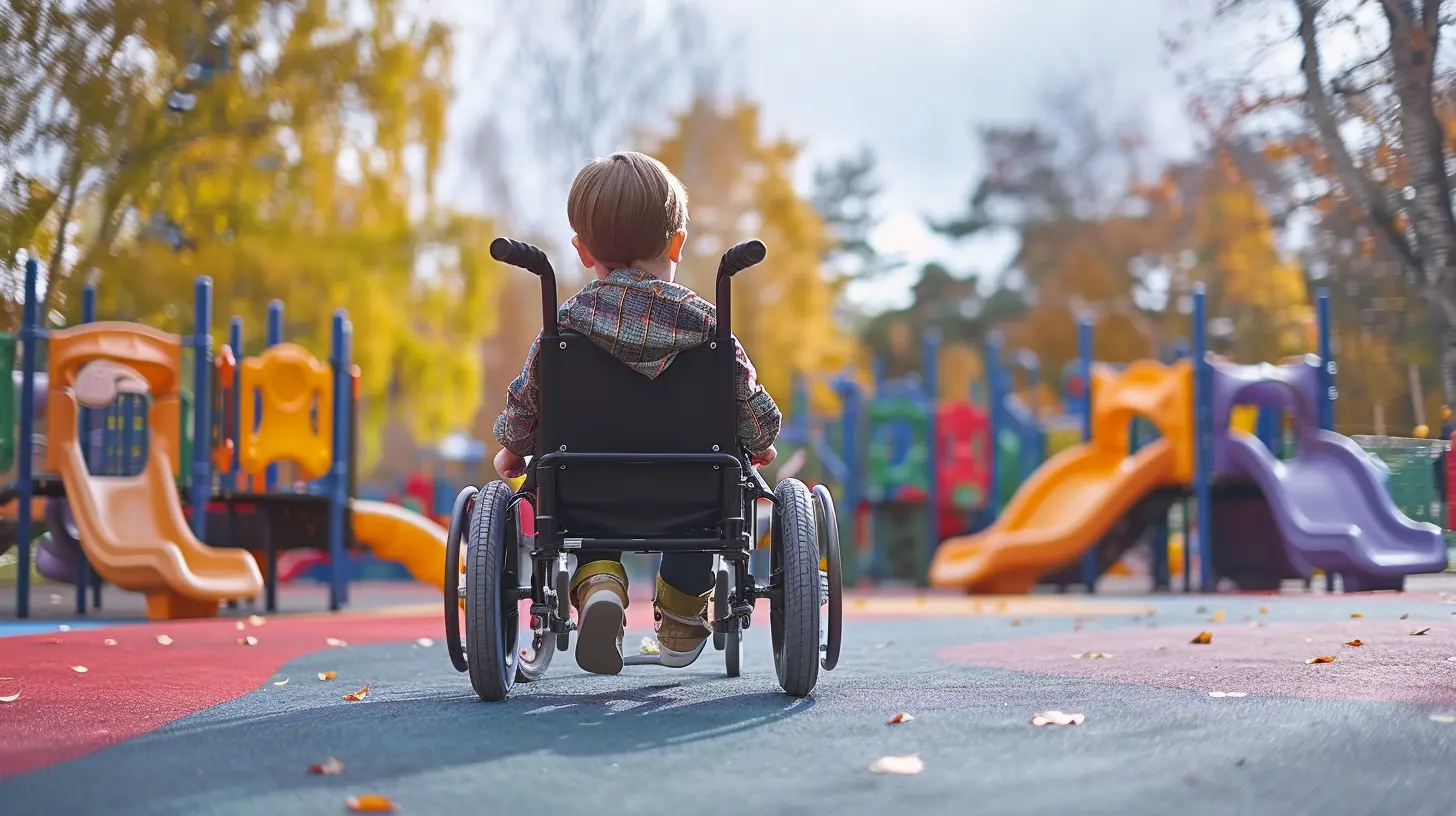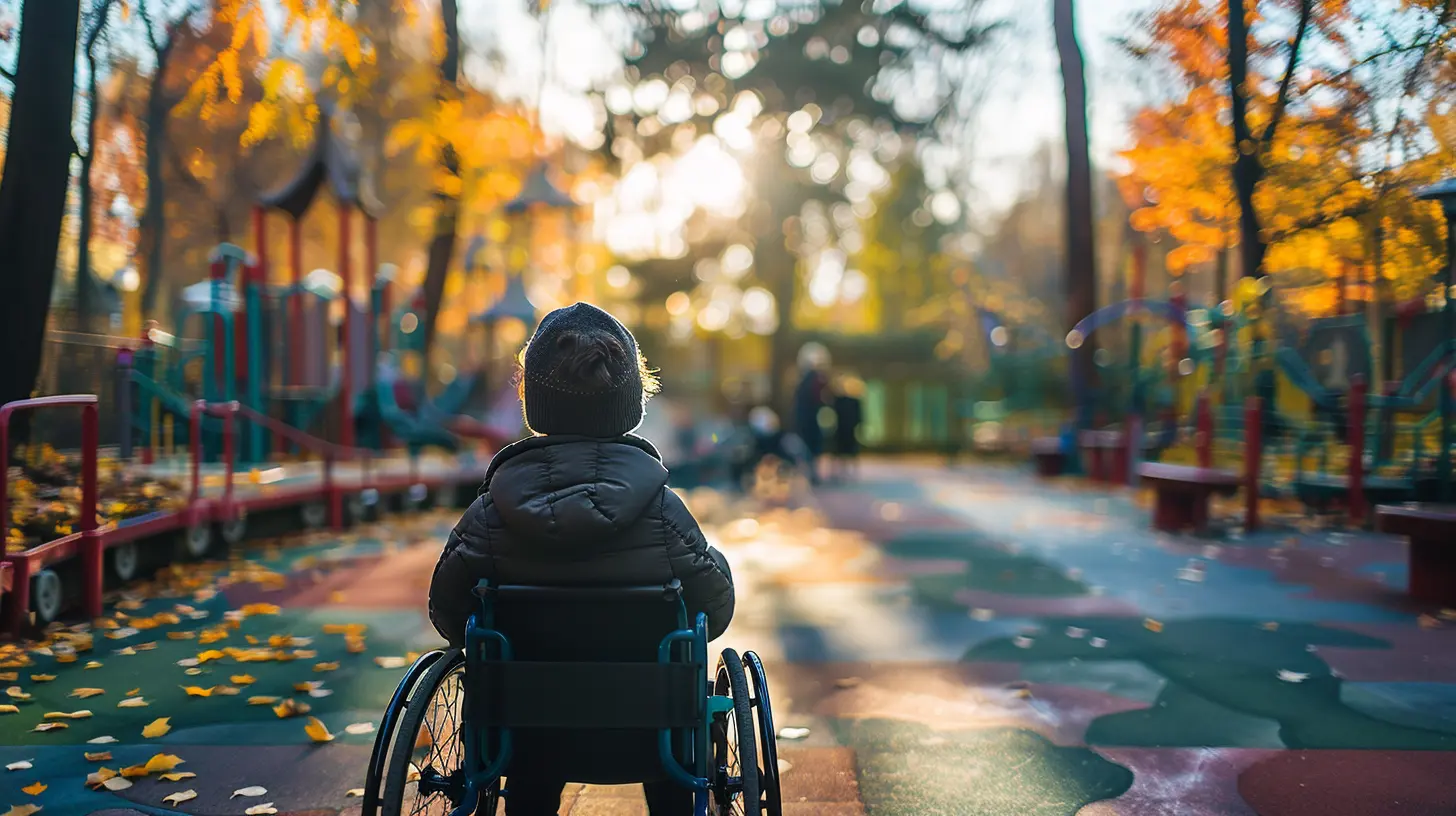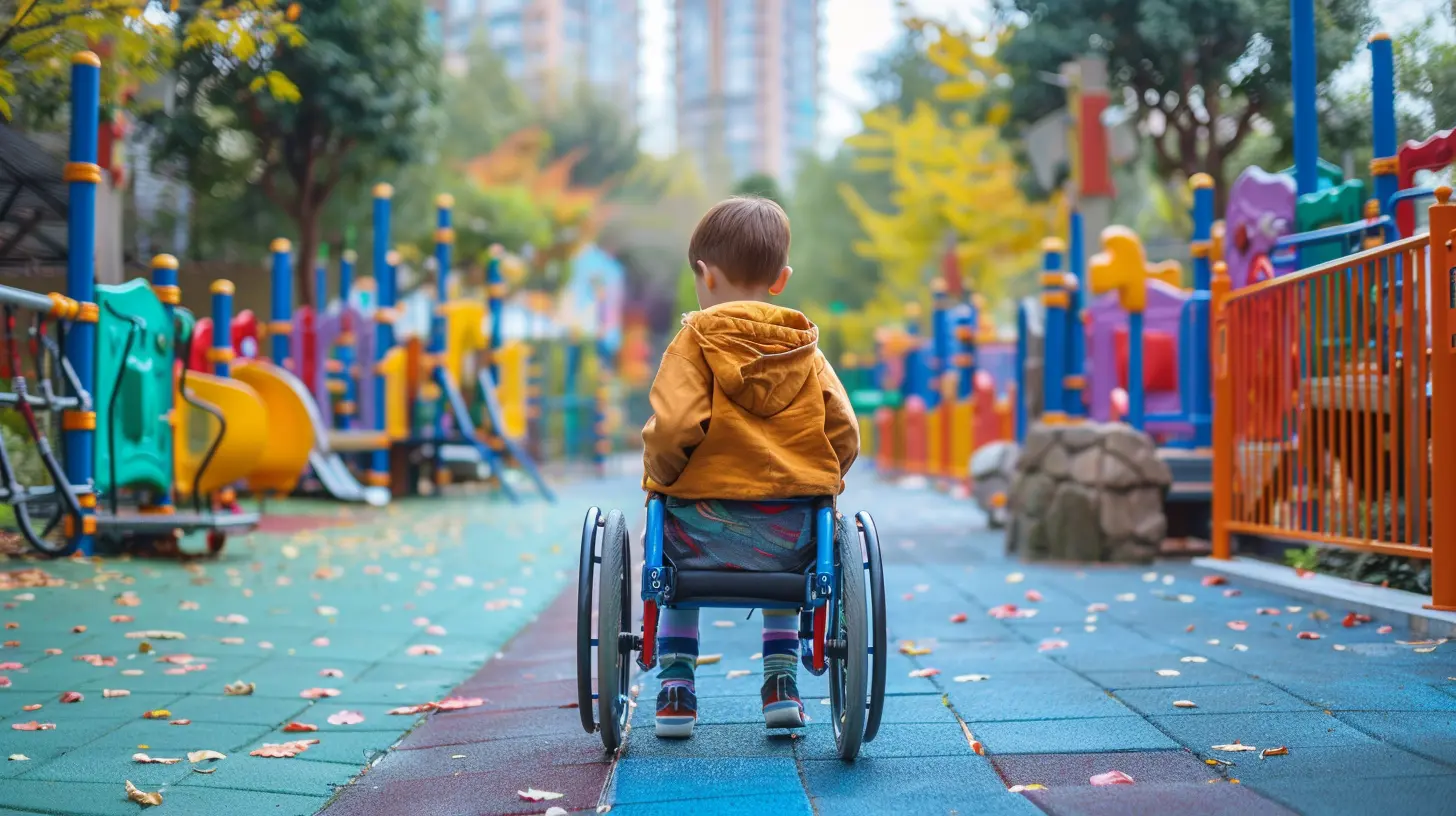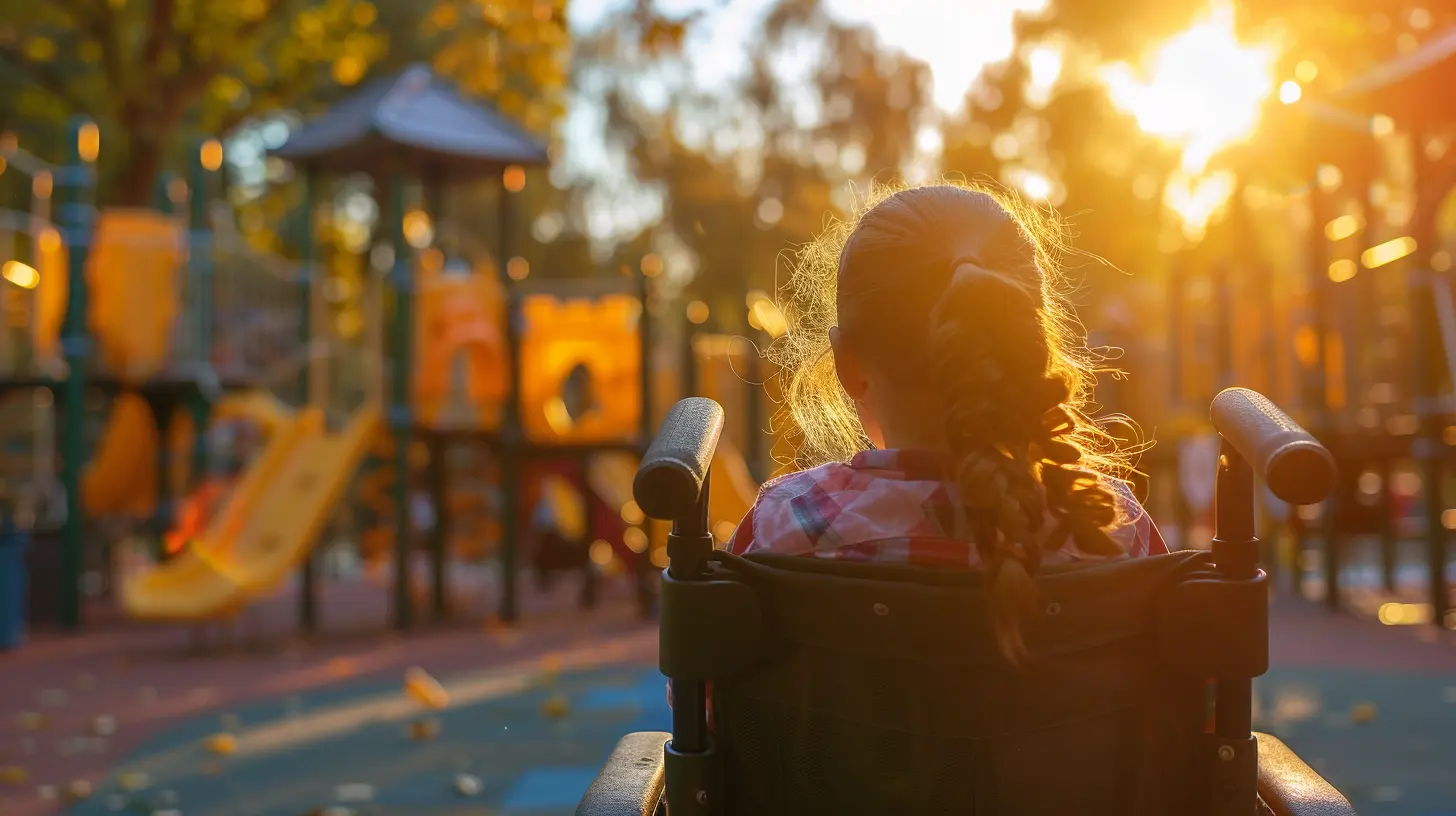Creating Inclusive Playgrounds: The Importance of Accessible Recreational Spaces
28 December 2024
Playgrounds are magical places. They're where kids make their first friends, take their first tumble, and learn how to navigate the world around them. But for many children, especially those with disabilities, these spaces can be filled with barriers rather than opportunities. That's why creating inclusive playgrounds—spaces where all children, regardless of ability, can play side by side—is so important. It’s about giving every child the chance to experience the joy of play, without exclusion.
In this article, we’re diving deep into why accessible recreational spaces matter, the benefits they bring to both children and communities, and how we can design them to truly be inclusive. So, whether you're a parent, teacher, park designer, or just someone who believes in equality, stick around! Let's explore how we can make playgrounds a place for everyone.
Why Inclusive Playgrounds Matter
Think about it for a second: when you were a kid, where did you spend most of your time playing? Probably at the local park or playground. But now imagine getting there and realizing you can't join in because the swings are too high, the sandbox is surrounded by steps, or there’s no ramp to access the jungle gym.For millions of children with disabilities, this is their reality. According to the CDC, 1 in 6 children in the U.S. has a developmental disability. That’s a significant number of kids who might find traditional playgrounds inaccessible. And when they can’t play, they’re missing out on more than just fun—they’re missing out on crucial developmental experiences.
The Social Impact
Play is one of the most important tools for learning social skills. It's on the playground that kids learn how to share, cooperate, and resolve conflicts. But if a child is sidelined due to inaccessibility, they’re also left out of these essential social interactions. When we create inclusive playgrounds, we are fostering an environment where all children, regardless of their abilities, can socialize and form meaningful relationships with their peers.The Developmental Benefits
It’s not just about socializing, though. Play is also essential for physical, cognitive, and emotional development. For children with disabilities, regular play can improve motor skills, boost self-esteem, and enhance problem-solving abilities. Inclusive playgrounds provide opportunities for all children to engage in physical activities that promote healthy development.
The Core Features of an Inclusive Playground
So, what exactly makes a playground inclusive? It’s more than just slapping a ramp next to a slide and calling it a day. True inclusivity requires thoughtful design that considers the needs of all children, regardless of their physical, cognitive, or sensory abilities.1. Accessible Equipment
One of the most obvious features of an inclusive playground is accessible equipment. This includes things like:- Ramps: These allow children who use wheelchairs or other mobility devices to access different areas of the playground.
- Swings: Regular swings can be challenging for kids with mobility issues. Inclusive playgrounds often feature bucket swings or wheelchair-accessible swings so that every child can safely enjoy the ride.
- Sensory Play Elements: Some children, particularly those with autism or sensory processing disorders, may struggle with certain types of play. Playgrounds designed with sensory elements—like textured surfaces, musical instruments, and tactile panels—can offer engaging experiences for all children.
2. Smooth, Accessible Surfacing
The ground beneath a playground is just as important as what’s on top of it. Traditional playground surfaces like wood chips or gravel can be difficult to navigate for children using walkers or wheelchairs. Inclusive playgrounds typically use smooth, rubberized surfaces that are easy for everyone to move across.3. Design for All Ages and Abilities
Inclusive playgrounds are designed to accommodate a range of ages and abilities. For example, younger children might enjoy low-to-the-ground play structures, while older kids can tackle taller climbing walls or more challenging activities. Importantly, these spaces should offer something for everyone, from toddlers to teens, and from children with physical disabilities to those with sensory or cognitive challenges.4. Quiet Spaces
Playgrounds can be noisy and overwhelming, especially for children with sensory sensitivities. Inclusive playgrounds often feature quiet areas where kids can take a break if they become overstimulated. These spaces give children the opportunity to recharge before jumping back into play.
How Inclusive Playgrounds Benefit Everyone
Here's the thing: inclusive playgrounds don't just benefit children with disabilities—they benefit everyone. How? Let’s break it down.1. Fostering Empathy and Understanding
When children of all abilities play together, they learn from each other. Kids who grow up in inclusive environments are more likely to develop empathy and understanding for people who might be different from them. This kind of early exposure to diversity can help reduce stigma and create a more inclusive society in the long run.2. Strengthening Communities
Think of a playground as a mini-community center. It’s not just for kids—parents, caregivers, and families gather there too. When playgrounds are accessible to all children, they naturally become more inclusive spaces for families as well. This creates stronger, more connected communities where everyone feels welcome.3. Encouraging Physical Activity
In today’s digital age, where children are spending more time in front of screens, encouraging physical activity is more important than ever. Inclusive playgrounds invite all children to engage in active, outdoor play, promoting healthier lifestyles. Plus, when parents see that the playground is accessible to their children, they’re more likely to bring them there, which leads to more frequent physical activity.
Overcoming Challenges in Creating Inclusive Playgrounds
While the benefits of inclusive playgrounds are clear, creating them isn’t always easy. There are several challenges that cities, schools, and communities face when trying to build accessible recreational spaces.1. Cost
One of the biggest hurdles is cost. Accessible equipment and specialized surfacing can be more expensive than traditional playground materials. However, there are grants, community fundraising options, and government programs that aim to offset these costs. It’s important to remember that while the initial investment might be higher, the long-term benefits to the community far outweigh the expenses.2. Space Constraints
In some cases, space can be an issue. Not all playgrounds have the room to accommodate large, inclusive structures. But even in smaller spaces, thoughtful design can still create an inclusive environment. For example, sensory play elements and adaptive equipment that don’t take up much room can make a significant impact.3. Community Buy-In
Another challenge can be getting community support. Some people might not see the need for inclusive playgrounds if they don’t personally know a child with a disability. This is where education comes in. It’s crucial to raise awareness about why inclusivity matters and how it benefits the entire community, not just a specific group of people.Steps We Can Take to Promote Inclusive Playgrounds
So, how can we advocate for more inclusive playgrounds in our communities? Here are some practical steps we can all take:1. Raise Awareness
Start by sharing information about the importance of inclusive playgrounds. This could be through social media, talking with local government officials, or even starting a petition in your community. The more people understand the need for accessible recreational spaces, the more likely it is that change will happen.2. Partner with Organizations
There are many organizations dedicated to promoting inclusive play, such as the National Center on Accessibility or KaBOOM! Partnering with these groups can provide valuable resources and support for creating accessible playgrounds in your area.3. Involve the Community
Get the community involved in the planning and design process. This ensures that the playground truly reflects the needs of the children who will be using it. Community engagement also helps build a sense of ownership and pride in the playground, making it a gathering place for everyone.Conclusion: Playgrounds for All
Creating inclusive playgrounds is about more than just meeting accessibility standards—it’s about creating spaces where every child feels they belong. When we design playgrounds that reflect the needs of all children, we’re building a more inclusive, compassionate, and connected community. After all, every child deserves the chance to swing, climb, explore, and laugh alongside their peers.So, the next time you pass by a playground, take a moment to look at it through the eyes of a child with a disability. Is it a place where they can play freely, or are there barriers in their way? If it’s the latter, then it’s time to start advocating for change. Because play really should be for everyone.
all images in this post were generated using AI tools
Category:
Special EducationAuthor:

Anita Harmon
Discussion
rate this article
18 comments
Avianna McKay
This article highlights a crucial issue—accessible playgrounds are vital for fostering inclusive communities. By ensuring that all children can enjoy recreational spaces, we promote social interaction and developmental opportunities. Let's advocate for more inclusive designs that cater to every child's needs and abilities.
February 16, 2025 at 4:06 AM

Anita Harmon
Thank you for your insightful comment! I completely agree—accessible playgrounds are essential for fostering inclusivity and ensuring that all children can thrive. Let's continue to advocate for designs that meet everyone's needs!
Bethany Potter
What a fantastic initiative! Creating inclusive playgrounds ensures every child can experience the joy of play. Let’s celebrate spaces that welcome all abilities and foster friendships through fun and laughter! 🎉✨
February 2, 2025 at 12:13 PM

Anita Harmon
Thank you for your support! Inclusivity in playgrounds truly enriches the experience for all children, fostering joy and friendships. Let's keep promoting accessible spaces! 🎉✨
Elwynn Wilkins
Creating inclusive playgrounds is essential for fostering a sense of belonging among all children. Accessible recreational spaces not only promote physical activity but also nurture social interactions. It's vital that we prioritize these inclusive designs, as they reflect our commitment to equity and community well-being.
January 30, 2025 at 7:29 PM

Anita Harmon
Thank you for highlighting the importance of inclusive playgrounds. They truly play a crucial role in promoting belonging, equity, and community well-being among children. Your insights underscore why we must prioritize accessible designs.
Pierce McLaurin
Everyone deserves joyful play; accessible spaces foster community and belonging.
January 26, 2025 at 3:28 AM

Anita Harmon
Absolutely! Accessible playgrounds are vital for fostering community, connection, and joy for everyone.
Katherine Webster
Creating inclusive playgrounds is vital for fostering social interaction and physical activity among children of all abilities. Accessible recreational spaces not only promote inclusion but also enhance developmental opportunities. By prioritizing universal design, we can ensure that every child feels welcome and empowered to play, learn, and grow together.
January 23, 2025 at 1:45 PM

Anita Harmon
Thank you for highlighting the importance of inclusive playgrounds. Your insights on universal design and its impact on children's development are crucial for fostering an environment where every child can thrive.
Hattie Lynch
Creating inclusive playgrounds is essential for fostering a sense of belonging and community among all children. Accessible recreational spaces empower every child to explore, learn, and grow together, breaking down barriers and building a brighter, more equitable future. Let's champion inclusivity for all!
January 20, 2025 at 6:00 AM

Anita Harmon
Thank you for your insightful comment! You perfectly capture the essence of why inclusive playgrounds are vital for nurturing community and promoting equity among children. Let's continue to advocate for accessible spaces for everyone!
Kendall Tucker
This article highlights the crucial need for inclusive playgrounds that cater to all children. Accessible recreational spaces promote social interaction, physical activity, and emotional well-being, ensuring every child enjoys the benefits of play, regardless of their abilities. A vital initiative!
January 17, 2025 at 9:45 PM

Anita Harmon
Thank you for your thoughtful comment! I'm glad you recognize the importance of inclusive playgrounds in fostering social interaction and well-being for all children.
Lanae McCullough
Empowering all through inclusive play!
January 16, 2025 at 3:59 AM

Anita Harmon
Absolutely! Inclusive play is essential for fostering community, creativity, and understanding among all children.
Otto McCabe
This article highlights the vital role of inclusive playgrounds in fostering community, promoting equity, and enhancing childhood development. Accessible recreational spaces not only cater to children of all abilities but also encourage social interaction, creativity, and physical activity, laying the foundation for a more inclusive society. A must-read for educators and planners!
January 13, 2025 at 8:37 PM

Anita Harmon
Thank you for your insightful comment! I'm glad you found the article valuable in highlighting the importance of inclusive playgrounds for community and childhood development.
Nolan Banks
Inclusive playgrounds foster community, promote diversity, and ensure every child experiences joy in play.
January 9, 2025 at 2:00 PM

Anita Harmon
Thank you for your insightful comment! Absolutely, inclusive playgrounds are vital for nurturing community bonds and ensuring that all children can enjoy the benefits of play.
Calder Castillo
This article raises intriguing questions about the design of inclusive playgrounds! How can we better understand the diverse needs of children? What innovative features can enhance accessibility while fostering creativity and social interaction?
January 4, 2025 at 1:54 PM

Anita Harmon
Thank you for your thoughtful comment! Understanding diverse needs requires engaging with children and caregivers, incorporating their feedback. Innovative features could include adaptable equipment, sensory-rich environments, and collaborative play zones to enhance both accessibility and social interaction.
Zorina Elliott
This article beautifully highlights the need for inclusive playgrounds! Creating spaces where every child can play and explore together not only fosters friendships but also teaches empathy from a young age. Let’s advocate for accessible recreational areas that celebrate diversity and inclusion!
January 2, 2025 at 5:24 AM

Anita Harmon
Thank you for your thoughtful comment! I completely agree—creating inclusive playgrounds is essential for fostering friendships and empathy among children. Let’s keep advocating for these vital spaces!
Daniella McIlwain
What a vital topic! Accessible recreational spaces are essential for fostering inclusivity and ensuring that all children can play, learn, and grow together. Let's continue to advocate for playgrounds that embrace diversity, allowing every child the opportunity to enjoy the simple joys of play. Thank you for highlighting this important issue!
December 31, 2024 at 3:21 AM

Anita Harmon
Thank you for your thoughtful comment! I completely agree—accessible playgrounds are crucial for fostering inclusivity and ensuring every child can thrive through play. Let's keep advocating for these important spaces!
Kalani Gilbert
Inclusive playgrounds are not just options; they are necessities. Every child deserves the opportunity to play and thrive, regardless of their abilities. Creating accessible recreational spaces fosters community, promotes social interaction, and enhances developmental growth. Let’s prioritize inclusive design to ensure that all children can experience the joy of play.
December 30, 2024 at 5:13 AM

Anita Harmon
Absolutely! Inclusive playgrounds are essential for fostering communities and ensuring every child can thrive through play, regardless of their abilities. Let's advocate for inclusive designs for a brighter, more equitable future.
Lacey McAdoo
This article highlights a vital issue in community planning. Inclusive playgrounds foster social connections and development for all children. Accessible recreational spaces are essential for nurturing a sense of belonging and promoting equality.
December 29, 2024 at 10:01 PM

Anita Harmon
Thank you for your insightful comment! I completely agree that inclusive playgrounds play a crucial role in fostering social connections and promoting equality among children.
Milena Price
Great article! 🌟 It's so important to prioritize inclusive playgrounds for all children. Accessible recreational spaces foster social skills, creativity, and a sense of belonging. Let's advocate for these vital environments to ensure every child can play and thrive!
December 29, 2024 at 3:35 AM

Anita Harmon
Thank you for your kind words! I completely agree—inclusive playgrounds are essential for nurturing social skills and ensuring every child can thrive. Let’s keep advocating for these vital spaces!
Kathleen Harmon
Inclusive playgrounds transcend mere accessibility; they embody the fundamental right of every child to play, explore, and connect. By cultivating environments that embrace diversity, we not only foster physical engagement but also nurture empathy and understanding, shaping a more inclusive society for future generations.
December 28, 2024 at 8:40 PM

Anita Harmon
Thank you for highlighting the deeper significance of inclusive playgrounds. They truly play a crucial role in fostering not just physical engagement, but also empathy and connection among children, paving the way for a more understanding society.
Sarina Valentine
What a fantastic article! Inclusive playgrounds truly enhance community well-being and ensure every child can play and thrive!
December 28, 2024 at 11:33 AM

Anita Harmon
Thank you so much! I'm glad you enjoyed the article and share the belief in the importance of inclusive playgrounds for all children!
MORE POSTS

How to Encourage Active Reading Habits in Students

How to Avoid Clichés in Your Writing

The Science Behind Reading Comprehension: What Every Teacher Should Know

The Need for Critical Thinking in Today’s Curriculum

How to Measure Success in E-Learning: Key Metrics to Track

How to Write for Online Readers: Tips for Digital Writing

How Mobile Learning is Transforming Education Access Worldwide

Building a Daily Routine for Academic Excellence

Tips for Writing Clear and Concise Sentences

Advanced Techniques for Creating Immersive E-Learning Environments

How to Make Problem Solving More Engaging for Students